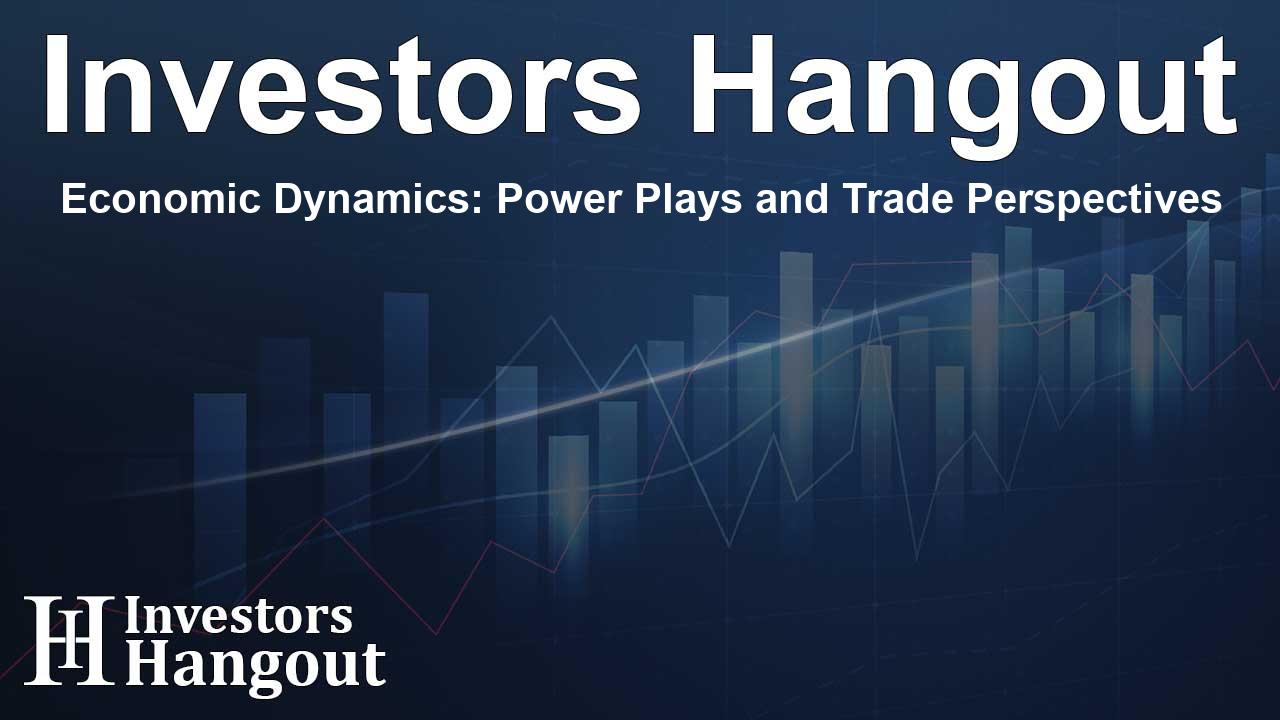Economic Dynamics: Power Plays and Trade Perspectives

Understanding the Economic Landscape Shift
The term ‘tariff’ often evokes strong reactions, but as the economic landscape evolves, a new concept is emerging: the ‘Power Play.’ This term might define the summer's economic narrative as discussions about tariffs continue to capture attention, yet a deeper game is unfolding among global trading partners.
Questioning Compliance and Commitments
As different parts of the world embrace summer, discussions regarding trade agreements are relentless. Many expected strict deadlines imposed on trading partners, yet these deadlines appear more pliable than anticipated. The ramifications tied to non-compliance remain uncertain. Nevertheless, it's a misstep to assume that pressure will ease, as the markets often interpret aggressive rhetoric followed by a softer approach in dealings.
This ongoing situation has morphed into an intricate economic maneuver, one that resembles blackmail more than benign negotiation. The stakes have escalated as the US urges trading partners to invest significantly within its borders to maintain favorable trade terms. This dual pressure can mean not only facing high tariffs but also necessitating a financial commitment that could otherwise be used domestically.
Investment Pledges Under Scrutiny
As negotiations progress, it remains to be seen if the much-discussed investment commitments in these talks will translate into tangible outcomes. Unlike imposing tariffs, which are straightforward to enact, such pledges invite ambiguity. This vagueness complicates enforcement and raises concerns about future accountability, particularly for regions like the European Union, reliant on corporate compliance.
For countries like Japan and South Korea, any commitments made largely appear in the form of loan agreements, which raises a crucial question: how will the US react if these nations do not meet their commitments? Even with an agreement, the looming issue of tariffs persists, demonstrating the multifaceted nature of these negotiations.
Global Market Reactions to Structural Changes
Markets often struggle to adapt to long-term structural shifts, and a prevalent response is to remain complacent until faced with a significant event. Currently, the focus is centered on the potential for a slow-down in the US economy, as the consequences of ongoing trade disputes gradually reveal themselves. Early indicators, such as a cooling labor market, highlight the necessity for economic recalibration, leading to expectations for interest rate cuts.
The resignation of a Federal Reserve member could pave the way for new leadership favorable to the current administration, significantly impacting future economic decisions. While positive strides are seen within the European Central Bank's framework, the effects of tariffs on the eurozone economy cannot be overlooked.
Key Economic Insights and Projections
Trade Dynamics: Recent agreements may not be as beneficial for US trading allies as originally hoped, especially concerning pharmaceutical tariffs. If the anticipated tariffs don't materialize, the overall tariff landscape may alter only slightly.
US Economic Outlook: A surge in inflation is expected as the ripple effects of tariffs hit various price points. However, this inflation might be short-lived, with forecasts showing disinflation trends on the horizon.
Eurozone Stability: Despite challenges, the US-EU agreement provides necessary stability for the time being. Adjusted growth forecasts indicate resilience, but the need for careful monitoring remains as the economic landscape evolves.
China's Economic Performance: As China's economy shows resilience, the interplay of strong first-half data and anticipated trade truce may lead to improved growth outlooks. However, vulnerabilities in private investment remain a concern.
Other Global Factors: The United Kingdom faces pressures from wage hikes and tax responsibilities, while Japan's economic stability may benefit from trade agreements and potential fiscal stimulus.
Conclusion: Navigating the New Economic Terrain
The current economic environment calls for keen awareness of the power dynamics at play as nations respond to tariffs, investments, and market expectations. With each development, the landscape becomes increasingly nuanced, demanding adaptability and strategic foresight from all involved.
Frequently Asked Questions
What is the significance of Power Play in economic terms?
The term 'Power Play' refers to the strategy of leveraging economic pressure to influence trade agreements and investment commitments from trading partners.
How do tariffs impact international trade?
Tariffs are taxes imposed on imports, affecting pricing, and market access, and influencing trading partners' investment strategies.
What are the potential outcomes of investment pledges in trade talks?
Investment pledges may lead to significant economic shifts, but their enforcement and compliance present challenges that could affect relationships between nations.
How can market reactions influence economic forecasts?
Market reactions provide insights into investor sentiment and can lead to adjustments in economic forecasts, particularly when trends indicate potential downturns.
Why are rate cuts anticipated in the near future?
Rate cuts are expected as organizations like the Federal Reserve respond to economic slowdowns and inflation pressures, aiming to stabilize the economy.
About The Author
Contact Hannah Lewis privately here. Or send an email with ATTN: Hannah Lewis as the subject to contact@investorshangout.com.
About Investors Hangout
Investors Hangout is a leading online stock forum for financial discussion and learning, offering a wide range of free tools and resources. It draws in traders of all levels, who exchange market knowledge, investigate trading tactics, and keep an eye on industry developments in real time. Featuring financial articles, stock message boards, quotes, charts, company profiles, and live news updates. Through cooperative learning and a wealth of informational resources, it helps users from novices creating their first portfolios to experts honing their techniques. Join Investors Hangout today: https://investorshangout.com/
The content of this article is based on factual, publicly available information and does not represent legal, financial, or investment advice. Investors Hangout does not offer financial advice, and the author is not a licensed financial advisor. Consult a qualified advisor before making any financial or investment decisions based on this article. This article should not be considered advice to purchase, sell, or hold any securities or other investments. If any of the material provided here is inaccurate, please contact us for corrections.
